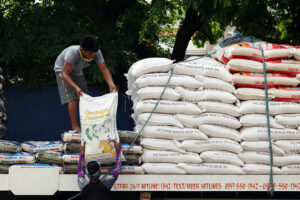Electronics, food exports seen little affected by slowing global trade

THE Department of Trade and Industry (DTI) said resilient electronics and food exports will be the Philippines’ best bets for weathering the 2023 slowdown in trade forecast by the World Trade Organization (WTO).
Trade Undersecretary Ceferino S. Rodolfo said on the sidelines of a World Bank event in Makati City on Thursday that electronics and food exports are not expected to be heavily affected by global headwinds.
“We are always affected by global developments, especially when it comes to our export sector. But we are banking on the resilience that they have exhibited during this pandemic and post-pandemic,” Mr. Rodolfo said.
“On the ground, we can see that our exporters, particularly those in the electronics sector or food … are critical, (and) not too sensitive when it comes to global downturns. Despite that projection, we will be working with the private sector so that we could sustain the recovery of the export sector,” he added.
On Oct. 5, the WTO said that global merchandise trade volume is projected to grow slower in 2023.
“WTO economists now predict global merchandise trade volumes to grow by 3.5% in 2022 — slightly better than the 3.0% forecast in April. For 2023, however, they foresee a 1.0% increase — down sharply from the previous estimate of 3.4%,” the WTO said in a statement.
The WTO said import demand is expected to soften due to various economic challenges such as high energy prices arising from the Russia-Ukraine war, monetary policy tightening in the US, restrictive coronavirus disease 2019 (COVID-19) policy in China, and the growing cost of fuel, food, and fertilizer.
“Policymakers are confronted with unenviable choices as they try to find an optimal balance among tackling inflation, maintaining full employment, and advancing important policy goals such as transitioning to clean energy…,” WTO Director-General Ngozi Okonjo-Iweala said.
“While trade restrictions may be a tempting response to the supply vulnerabilities that have been exposed by the shocks of the past two years, a retrenchment of global supply chains would only deepen inflationary pressures, leading to slower economic growth and reduced living standards over time. What we need is a deeper, more diversified and less concentrated base for producing goods and services,” she added.
The Philippines posted a $43.23-billion trade deficit in 2021, wider than the $24.597 billion reported in 2020, the Philippine Statistics Authority (PSA) said in April.
On the other hand, total trade, or the sum of exports and imports, rose 24.2% to $192.53 billion in 2021.
Mr. Rodolfo said the Philippines hopes to improve its ranking in Southeast Asia in terms of net foreign direct investment (FDI) inflows, noting that the country’s current rank is fourth.
“We are still lagging behind our neighbors. Actually, the Bangko Sentral ng Pilipinas (BSP) just revised its net FDI inflows for the Philippines for 2021. Previously reported was $10.5 billion but they just revised it to $12.5 billion,” Mr. Rodolfo said.
“First is Singapore at about $80 billion. Indonesia is about $20 billion. Vietnam is about $15.7 billion. Then us (Philippines) at $12.5 billion. So, the target is maybe we can surpass Vietnam in the first half of this administration, then surpass Indonesia in the latter part of this administration,” he added. — Revin Mikhael D. Ochave




